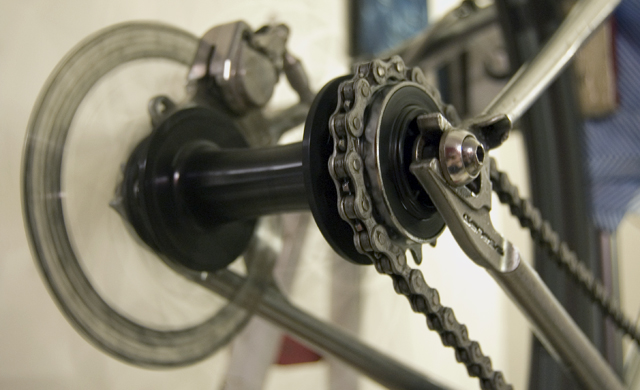 A bicycle in dangerous disrepair is like a flighty steed: you might gallantly suppose you can handle the challenges, but you stand a good chance of ending up on the ground before it comes time to dismount. In either case, you are better off choosing a steady mount than risking life and limb for lack of a more convenient option. While a bicycle is less likely than a horse to chew on your clothing after bucking you into a ditch, serious bicycle accidents can nevertheless burn a hole in your pocket when it comes time to pay the piper—or rather, the doctor.
A bicycle in dangerous disrepair is like a flighty steed: you might gallantly suppose you can handle the challenges, but you stand a good chance of ending up on the ground before it comes time to dismount. In either case, you are better off choosing a steady mount than risking life and limb for lack of a more convenient option. While a bicycle is less likely than a horse to chew on your clothing after bucking you into a ditch, serious bicycle accidents can nevertheless burn a hole in your pocket when it comes time to pay the piper—or rather, the doctor.
It isn’t always easy to spot those flirtations with disaster that can lead to bicycle accidents. Many malfunctions can seem insignificant to those who don’t understand the potential consequences. Thus, for the reader’s enlightenment, a handful of warning signs that you and your bicycle may be headed for disaster are listed below:
Table of Contents
1. Clicking Pedals
The pedals are your primary means of controlling your bicycle. If a pedal were to detach—or if you were to lose your grip on it because it was improperly attached—it could spell disaster. You cannot expect to avoid bicycle accidents if you can’t govern your vehicle. Fortunately, there is a harbinger of these types of dangers in the form of the “single pedal click” that becomes audible as a pedal becomes loose.
2. Broken Spokes
A sudden increase in pressure on a bicycle’s wheel (hitting a pothole, for instance) can cause a spoke to break. Typically, a breaking spoke does not result in the bicycle immediately spinning out of control and thrusting its rider over the edge of a nearby ravine. In fact, a broken spoke does not constitute an enormous hazard per se if it does not get entangled in any other spokes/the chain. However, the added stress on the other spokes and general weight imbalance can cause your bike to wobble in the short run and compromise the integrity of your wheel in the long run.
3. Poorly-Inflated Tires
Tire inflation is important because it determines the way your bicycle will interact with the terrain you’re riding on. Naturally, the bicycle will not run if there is too little air in the tires; but if the tire pressure is too great, your bicycle will be more prone to bounce on ruts or bits of gravel. The ideal tire pressure is high enough to facilitate speed, yet low enough to absorb shock.
4. Loose Bolts
The ability of a bicycle to run smoothly, turn crisply, and simply hold itself together depends on the strength of the bolts holding it together. When a bolt is loose on your bicycle, a wheel may wavier or even come loose; or the pedals crankshaft may find itself alienated from the crank it manipulates. Bicycle accident avoidance depends on a bicycle’s responsiveness; and this is jeopardized when the bolts are not tight.
Unfortunately, it is entirely possible to be involved in a bicycle accident on a mount that is in excellent condition. The maneuvers of other drivers cannot always be predicted or avoided. However, when an act of recklessness leads to an injury, you don’t have to let the hole burn in your pocket. To request more information in the form of a free booklet or call 1-800-LAW-BOOK, compliments of personal injury attorneys Good Guys Injury Law.
Image courtesy of Neil Cain